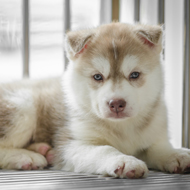Puppy buying report launched at Westminster

"Puppy farming dogs, breeding high volumes of puppies, are abhorrent practices to British puppy buyers."
Nearly a fifth of dog owners say their puppy experienced a health or welfare problem shortly after purchase, according to a report recently launched in Westminster.
The report follows a year-long survey of the British public's puppy-buying habits. It was led by a coalition of anti-puppy farming organisations, including Cariad and TV vet Marc Abraham's Pup Aid.
Of more than 4,000 responses from dog owners, nearly 45 per cent had bought their puppy from one of the online classified sites - predominantly Pets4Homes (30 per cent).
While Pets4Homes adheres to the PAAG minimum standards for online classified ads, authors of the report had concerns that adverts by commercial sellers are likely to be premium and therefore more prominent, whereas small scale responsible sellers often do not need to advertise as they have such long waiting lists. They suggest more work needs to be done to educate the public about irresponsible ads.
Almost 80 per cent of people believed they had seen the pup with its mother, but 18 per cent had not and 3 per cent thought the mother they saw may have been a 'fake'.
Out of those dog owners whose pets became sick shortly after arriving home and required veterinary treatment, the majority (66 per cent) paid less than £200. But over a fifth paid £201 to £1,000, while 6 per cent paid in excess of £3,000. And just over 70 per cent of these did not take any action against the seller.
Interestingly, whether or not a seller was licensed did not rank highly in the list of reasons for choosing a particular seller - coming in seventh out of 10.
Comments supplied with the survey responses indicate that those buyers who took part would not intentionally buy from a low welfare supplier. Eight per cent of respondents suspected their pet had come from a puppy farm and were angry and upset that they had been duped.
Commenting on the report's launch, Marc Abraham said: "The interest shown by so many MPs about the plight of puppy farmed dogs is heartening, we were impressed by the level of engagement in the findings of our survey.
"What is clear from the feedback we got from the survey is that puppy farming dogs, breeding high volumes of puppies, are abhorrent practices to British puppy buyers, they demand higher welfare for their puppies, which is why I won't stop campaigning for #wheresmum".



 The Veterinary Medicines Directorate (VMD) is inviting applications from veterinary students to attend a one-week extramural studies (EMS) placement in July 2026.
The Veterinary Medicines Directorate (VMD) is inviting applications from veterinary students to attend a one-week extramural studies (EMS) placement in July 2026.